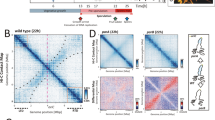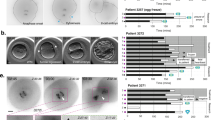Abstract
IN a recent study of the development of the male gamete in the style of Lilium regale, O'Mara1 states that no equatorial plate is formed, but that at metaphase the chromosomes lie scattered in the pollen tube. Welsford2, on the other hand, illustrates in L. Martagon (her Fig. 16) the complement normally arranged on a plate.
This is a preview of subscription content, access via your institution
Access options
Subscribe to this journal
Receive 51 print issues and online access
$199.00 per year
only $3.90 per issue
Buy this article
- Purchase on Springer Link
- Instant access to full article PDF
Prices may be subject to local taxes which are calculated during checkout
Similar content being viewed by others
References
O'Mara, J., Bot. Gaz., 94; 1933.
Welsford, E. S., Ann. Bot., 28; 1914.
Wilson, E. B., “The Cell in Development and Heredity”, (New York, 1925). Fig. 59.
Darlington, C. D., Proc. Roy. Soc., B, 117 (in the press).
Sharp, L. W., Bot. Gaz., 88; 1929.
Author information
Authors and Affiliations
Rights and permissions
About this article
Cite this article
UPCOTT, M. Chromosomes of the Tulip in Mitosis. Nature 135, 957–958 (1935). https://doi.org/10.1038/135957b0
Issue Date:
DOI: https://doi.org/10.1038/135957b0
This article is cited by
-
Spiral Structure of Chromosomes in Osmunda
Nature (1936)
-
Chromosome structure in relation to the chromosome cycle
The Botanical Review (1936)
Comments
By submitting a comment you agree to abide by our Terms and Community Guidelines. If you find something abusive or that does not comply with our terms or guidelines please flag it as inappropriate.



